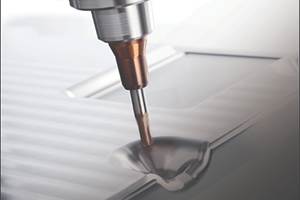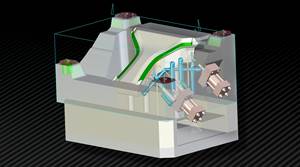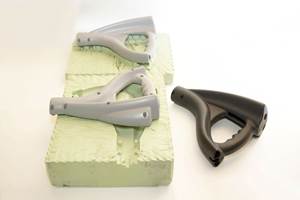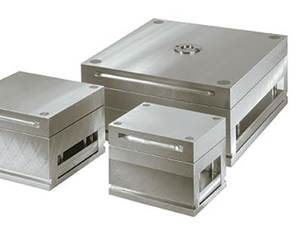Objet’s 3D Printed Folding Stool as Tough as ABS-Grade Engineering Plastics
Full-size folding stool made of new Objet ABS-like Digital Material is printed in a single print job on the Objet Connex multi-material 3-D printer.
Objet Ltd., the innovation leader in 3-D printing for rapid prototyping and additive manufacturing, made news today by demonstrating a full-size folding stool able to support over 100 kg. Like the Objet 3-D-printed skateboard (video), Objet engineers printed the stool in a single print job, using the new Objet ABS-like Digital Material (RGD5160-DM) – a new functionally advanced material which is jetted as a composite material on the Objet Connex multi-material 3-D printer (video).
The folding stool, which sits 48 cm (19 inches) off the ground, has similar high dimensional stability, thermal resistance, and toughness as ABS-grade engineering plastics, enabling it to repeatedly sustain the weight of a person.
Commenting on the folding stool, Gilad Gans, Executive Vice President at Objet said; “The folding stool is a demonstration of the unique possibilities available using Objet’s multi-material 3D printers including the new Objet260 Connex. Our technology represents the most effective way of functionally testing complex design ideas. Whether skateboards or folding stools, the prototypes that come out of Objet Connex 3-D printers look like the real thing and also perform like the real thing. Not only can this stool carry the weight of a person, but it was actually printed in the fold-up position in a single print job and then opened-up upon removal from the printer to be used.”
The Objet ABS-like Digital Material is a high-impact material (65-80J/m or 1.22-1.50 ft lb/in), with high-temperature-resistance (65°C or 149°F and after thermal post treatment 90°C or 194°F). The material is ideal for manufacturers and engineers looking to functionally simulate products made of ABS-grade engineering plastics, including snap-fit parts, durable and movable parts and products requiring drop-testing.
With the new ABS-like Digital Material, the number of Objet 3-D printing materials is brought to a total of 65, including 51 composite materials (Digital Materials), for a wide range of rapid prototyping purposes, enabling realistic product visualization to advanced functional verification.
About Objet: Objet Ltd., the innovation leader in 3-D printing for rapid prototyping and additive manufacturing, provides 3-dimensional printing systems that enable manufacturers and industrial designers to reduce cost of product development and dramatically shorten time-to-market of new products. Objet’s ultra-thin-layer, high-resolution 3-dimensional printing systems and materials utilize PolyJet polymer jetting technology, to print ultra-thin 16-micron layers. The Objet Connex multi-material family is based on Objet’s PolyJet Matrix Technology, which jets multiple model materials simultaneously and creates composite Digital Materials on the fly. The market-proven Objet Eden line of 3-D Printing Systems and the Objet24 and Objet30 desktop 3-D printers are based on Objet’s patented office-friendly PolyJet Technology. All Objet systems use Objet’s FullCure® materials to create accurate, clean, smooth, and highly detailed 3-D parts. Objet systems are in use by customers worldwide, including Fortune 100 companies, in multiple industries such as dental, medical, medical devices, defense, education, consumer electronics, automotive, toys, consumer goods and electronics, footwear and service bureaus. Founded in 1998, Objet serves its growing global customer base through offices in USA, Mexico, Europe, Japan, China and Hong Kong, and a global network of distribution partners. Objet owns more than 50 patents and patent pending inventions. For more information, visit us at www.objet.com, and for more about 3-D printing industry-related news, business issues and trends, read the Objet blog.
Related Content
Moldmakers Deserve a Total Production Solution
Stability, spindle speed and software are essential consideration for your moldmaking machine tool.
Read MoreForces and Calculations Are Key to Sizing Core Pull Hydraulic Cylinders
To select the correct cylinder, consider both set and pull stroke positions and then calculate forces.
Read MorePlastic Prototypes Using Silicone Rubber Molds
How-to, step-by-step instructions that take you from making the master pattern to making the mold and casting the plastic parts.
Read MoreConsiderations for Mold Base Material Selection
Choosing the right material can greatly affect the profitability and cost of your application.
Read MoreRead Next
How to Use Continuing Education to Remain Competitive in Moldmaking
Continued training helps moldmakers make tooling decisions and properly use the latest cutting tool to efficiently machine high-quality molds.
Read MoreHow to Use Strategic Planning Tools, Data to Manage the Human Side of Business
Q&A with Marion Wells, MMT EAB member and founder of Human Asset Management.
Read MoreReasons to Use Fiber Lasers for Mold Cleaning
Fiber lasers offer a simplicity, speed, control and portability, minimizing mold cleaning risks.
Read More

















.jpg;maxWidth=300;quality=90)







